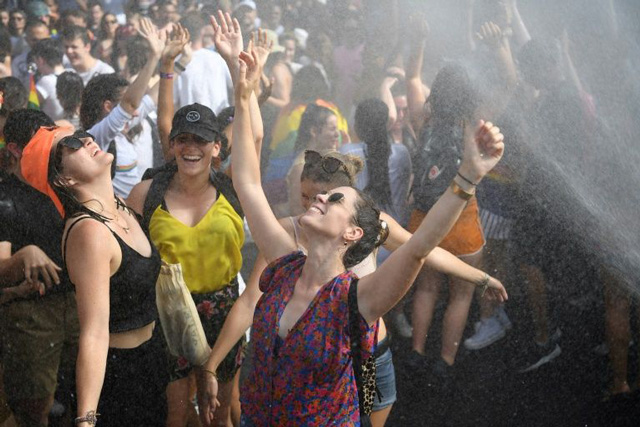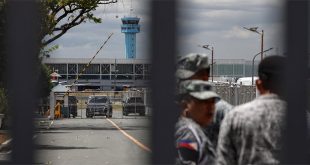
Paris, France | AFP | A welcome temperature drop came to western parts of Europe on Sunday, after almost a week-long heatwave, but hundreds of Spanish firefighters and soldiers continued to battle three major blazes.
France too had to contend with fire in the south of the country — and some farmers there counted the cost of the heatwave to their grape vines.
In Germany there was no respite, with a record high temperature for June and athletes hit hard by the punishing weather.
In Rome, Pope Francis told pilgrims in Saint Peter’s Square: “I pray for those who have suffered the most from the heat in recent days; the sick, the elderly, those who work outside, on construction sites… let no one be abandoned or exploited.”
Six days of intense heat fuelled huge blazes and spikes of pollution in many countries. According to official figures, it claimed four lives in France, two in Italy and another two in Spain.
The victims included a 17-year-old harvest worker, a 33-year-old roofer and a 72-year-old homeless man.
In northern and western France Sunday, hot-weather warnings were lifted days after the country posted successive record temperatures as it sizzled alongside Italy, Spain and several central European nations.
The mercury was predicted to drop by as much as 10 degrees Celsius (18 degrees Fahrenheit) in Paris Sunday, but to continue rising in central and eastern Germany and in Italy before rainstorms cool things down by Tuesday.
On Sunday, a record 38.9 C was measured in Bad Kreuznach in Germany’s Rhineland-Palatinate state, according to data from the national weather service, topping the previous high of 38.6 C recorded Wednesday in two other towns.
Sunday’s Austrian Grand Prix in the central city of Spielberg took place in temperatures of 35 degrees.
– Runners collapse –
In Frankfurt, the blazing heat took its toll on US athlete Sarah True. Leading the Ironman European Championship race, she collapsed a kilometre from home and was unable to finish.
The c service in the northern city of Hamburg reported that “many runners collapsed during a half-marathon which took place under a heat that reached 33 degrees. Twenty-four runners had to be brought to clinics for treatment.”
Police used water cannons to help cool down the crowd at a summer street festival in Soemmerda in Thuringia state.
Spanish authorities ordered the evacuation Sunday of around 40 people and closed four roads as a raging wildfire advanced in the centre of the country, southwest of Madrid, amid scorching temperatures.
Another major fire burned near the central city of Toledo, while in northeastern Catalonia, an inferno that begun on Wednesday was being brought under control, regional authorities said.
Four Spanish weather stations have reported June records from 38.8 C to 41.9 C.
In France, fires razed about 600 hectares (1,480 acres) and dozens of houses in the southern Gard department.
– Like a ‘blowtorch’ –
This is the same region where a French record of 45.9 C was set Friday, prompting the Meteo France weather service to issue its highest alert level of red for the first time.
Some winemakers in southern France said their crops, which had already suffered three years of water shortages, were badly burnt.
Some vines, said winegrower Jerome Despey, looked as if they had been gone over with a “blowtorch”.
“I’ve been a winegrower for 30 years. I have never seen a vine burnt by a sudden onset of heat,” as had happened on Friday, Despey added.
France is the seventh European country to ever register a plus 45-degree temperature, along with Bulgaria, Portugal, Italy, Spain, Greece and North Macedonia, Meteo France said.
Meteorologists point to a blast of hot air from northern Africa for the scorching early European summer, and scientists warn that global warming linked to human fossil fuel use could make such heatwaves more frequent.
The German national weather service said temperatures were more than four degrees higher in June than an international reference period of 1981-2010.
The stifling heat also caused air quality to nosedive in some European cities, prompting local authorities to take anti-pollution measures such as temporary bans on the use of cars that cause the most pollution.
 The Independent Uganda: You get the Truth we Pay the Price
The Independent Uganda: You get the Truth we Pay the Price


